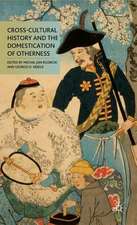Oral History Theory
Autor Lynn Abramsen Limba Engleză Hardback – 9 mar 2016
Structured around key themes such as the peculiarities of oral history, the study of the self, subjectivity and intersubjectivity, memory, narrative, performance, power and trauma, each chapter provides a clear and user-friendly explanation of the various theoretical approaches, illustrating these with examples from the rich field of published oral history and making suggestions for the practicing oral historian. This second edition includes a new chapter on trauma and ethics, a preface discussing new developments in the field and updated glossary and further reading sections.
Supplemented by a new companion website (www.routledge.com/cw/abrams) containing a comprehensive range of case studies, audio material and further resources, this book will be invaluable to experienced and novice oral historians, professionals, and students who are new to the discipline.
| Toate formatele și edițiile | Preț | Express |
|---|---|---|
| Paperback (1) | 310.71 lei 6-8 săpt. | |
| Taylor & Francis – 21 mar 2016 | 310.71 lei 6-8 săpt. | |
| Hardback (1) | 1006.43 lei 6-8 săpt. | |
| Taylor & Francis – 9 mar 2016 | 1006.43 lei 6-8 săpt. |
Preț: 1006.43 lei
Preț vechi: 1227.35 lei
-18% Nou
Puncte Express: 1510
Preț estimativ în valută:
192.64€ • 209.32$ • 161.92£
192.64€ • 209.32$ • 161.92£
Carte tipărită la comandă
Livrare economică 21 aprilie-05 mai
Preluare comenzi: 021 569.72.76
Specificații
ISBN-13: 9781138905382
ISBN-10: 1138905380
Pagini: 252
Dimensiuni: 156 x 234 mm
Greutate: 0.63 kg
Ediția:Revised
Editura: Taylor & Francis
Colecția Routledge
Locul publicării:Oxford, United Kingdom
ISBN-10: 1138905380
Pagini: 252
Dimensiuni: 156 x 234 mm
Greutate: 0.63 kg
Ediția:Revised
Editura: Taylor & Francis
Colecția Routledge
Locul publicării:Oxford, United Kingdom
Public țintă
Postgraduate and UndergraduateCuprins
Preface to the second edition: new directions in oral history. Acknowledgments. 1 Introduction: turning practice into theory. 2. The peculiarities of oral history. 3. Self. 4. Subjectivity and intersubjectivity. 5. Memory. 6. Narrative. 7. Performance. 8. Power. 9. Trauma and ethics. Glossary. Notes. Guide to further reading. Index.
Notă biografică
Lynn Abrams is Professor of Modern History at the University of Glasgow, UK. She has published widely in the field of women’s, gender and oral history, including Myth and Materiality in a Woman’s World: Shetland 1800-2000 (2005) and The Making of Modern Woman: Europe 1789-1918 (2002).
Recenzii
"Abrams introduces analytical theories, examines their application to oral history narratives, and provides "suggestions for how to translate theory into practice." Required reading for oral historians, the book belongs in every academic library. Summing Up: Essential." CHOICE
"The first edition of Lynn Abrams' Oral History Theory uniquely provided a comprehensive overview of the theory underpinning the practice of oral history. This updated second edition, with new material on trauma, ethics, collaborative practice and the impact of digital technologies will be an essential read for students, researchers and interviewers."
Andrew Flinn, University College London, UK
"By explaining often complex theoretical constructs and debates in a user-friendly and understandable language, this newly updated edition will prove invaluable to oral history practitioners and students alike. Cutting-edge in its outlook and approach, this edition extends our understanding of on-going developments by focussing on the impact of new digital technologies, the growing interest in trauma or ‘crisis’ oral history, and the theoretical and practical implications of conducting collaborative oral history projects."
Andrew Edwards, Bangor University, UK
"Oral History Theory provides students and practitioners of oral history with an accessible introduction to complex ideas shaping the field. This well-organized text lays out a compilation of research and examples that fostered deeper understanding among students as they conducted their own interviews."
Joanne Goodwin, University of Nevada, Las Vegas, USA
"In this book, Lynn Abrams speaks to a range of potential audiences interested in the practice and outcomes of oral history research. The text includes theoretical analysis, practical advice and reference to a range of case studies. This newly revised edition also includes consideration of dealing with ‘trauma’ and the ethical issues arising in oral history practice and analysis. The accompanying website now makes this an essential tool for teaching, learning and research in the field."
Melanie Ilic, University of Gloucestershire, UK
"The first edition of Lynn Abrams' Oral History Theory uniquely provided a comprehensive overview of the theory underpinning the practice of oral history. This updated second edition, with new material on trauma, ethics, collaborative practice and the impact of digital technologies will be an essential read for students, researchers and interviewers."
Andrew Flinn, University College London, UK
"By explaining often complex theoretical constructs and debates in a user-friendly and understandable language, this newly updated edition will prove invaluable to oral history practitioners and students alike. Cutting-edge in its outlook and approach, this edition extends our understanding of on-going developments by focussing on the impact of new digital technologies, the growing interest in trauma or ‘crisis’ oral history, and the theoretical and practical implications of conducting collaborative oral history projects."
Andrew Edwards, Bangor University, UK
"Oral History Theory provides students and practitioners of oral history with an accessible introduction to complex ideas shaping the field. This well-organized text lays out a compilation of research and examples that fostered deeper understanding among students as they conducted their own interviews."
Joanne Goodwin, University of Nevada, Las Vegas, USA
"In this book, Lynn Abrams speaks to a range of potential audiences interested in the practice and outcomes of oral history research. The text includes theoretical analysis, practical advice and reference to a range of case studies. This newly revised edition also includes consideration of dealing with ‘trauma’ and the ethical issues arising in oral history practice and analysis. The accompanying website now makes this an essential tool for teaching, learning and research in the field."
Melanie Ilic, University of Gloucestershire, UK
"... This second edition reproduces the original text, all still relevant, with the addition of a ninth chapter entitled “Trauma and Ethics.” Abrams (Univ. of Glasgow, UK) explains that the additional chapter “treats trauma as a sub-field of oral history in its own right, one which has grown exponentially as narrative-based approaches to collective reconciliation and memorialisation and to the therapeutic treatment of individuals have gained widespread assent.” It both complements and expands the original text, focusing on “the collection and analysis of histories of extreme human experiences, sometimes termed crisis oral history.” Ethics and safety are emphasized. The second edition merits serious consideration for any collection that supports oral history courses or students and scholars using oral history in their research."
B. M. Banta, Arkansas State University
"... it outlines all of our current concerns, takes a wide purview of past and current work, provides a handy guide to relevant middle-level theories from a wide variety of perspectives, and yet leaves room for the engaged reader to explore beyond its boundaries."
Ronald J. Grele, Oral History Review
"The first edition of Lynn Abrams' Oral History Theory uniquely provided a comprehensive overview of the theory underpinning the practice of oral history. This updated second edition, with new material on trauma, ethics, collaborative practice and the impact of digital technologies will be an essential read for students, researchers and interviewers."
Andrew Flinn, University College London, UK
"By explaining often complex theoretical constructs and debates in a user-friendly and understandable language, this newly updated edition will prove invaluable to oral history practitioners and students alike. Cutting-edge in its outlook and approach, this edition extends our understanding of on-going developments by focussing on the impact of new digital technologies, the growing interest in trauma or ‘crisis’ oral history, and the theoretical and practical implications of conducting collaborative oral history projects."
Andrew Edwards, Bangor University, UK
"Oral History Theory provides students and practitioners of oral history with an accessible introduction to complex ideas shaping the field. This well-organized text lays out a compilation of research and examples that fostered deeper understanding among students as they conducted their own interviews."
Joanne Goodwin, University of Nevada, Las Vegas, USA
"In this book, Lynn Abrams speaks to a range of potential audiences interested in the practice and outcomes of oral history research. The text includes theoretical analysis, practical advice and reference to a range of case studies. This newly revised edition also includes consideration of dealing with ‘trauma’ and the ethical issues arising in oral history practice and analysis. The accompanying website now makes this an essential tool for teaching, learning and research in the field."
Melanie Ilic, University of Gloucestershire, UK
"The first edition of Lynn Abrams' Oral History Theory uniquely provided a comprehensive overview of the theory underpinning the practice of oral history. This updated second edition, with new material on trauma, ethics, collaborative practice and the impact of digital technologies will be an essential read for students, researchers and interviewers."
Andrew Flinn, University College London, UK
"By explaining often complex theoretical constructs and debates in a user-friendly and understandable language, this newly updated edition will prove invaluable to oral history practitioners and students alike. Cutting-edge in its outlook and approach, this edition extends our understanding of on-going developments by focussing on the impact of new digital technologies, the growing interest in trauma or ‘crisis’ oral history, and the theoretical and practical implications of conducting collaborative oral history projects."
Andrew Edwards, Bangor University, UK
"Oral History Theory provides students and practitioners of oral history with an accessible introduction to complex ideas shaping the field. This well-organized text lays out a compilation of research and examples that fostered deeper understanding among students as they conducted their own interviews."
Joanne Goodwin, University of Nevada, Las Vegas, USA
"In this book, Lynn Abrams speaks to a range of potential audiences interested in the practice and outcomes of oral history research. The text includes theoretical analysis, practical advice and reference to a range of case studies. This newly revised edition also includes consideration of dealing with ‘trauma’ and the ethical issues arising in oral history practice and analysis. The accompanying website now makes this an essential tool for teaching, learning and research in the field."
Melanie Ilic, University of Gloucestershire, UK
"... This second edition reproduces the original text, all still relevant, with the addition of a ninth chapter entitled “Trauma and Ethics.” Abrams (Univ. of Glasgow, UK) explains that the additional chapter “treats trauma as a sub-field of oral history in its own right, one which has grown exponentially as narrative-based approaches to collective reconciliation and memorialisation and to the therapeutic treatment of individuals have gained widespread assent.” It both complements and expands the original text, focusing on “the collection and analysis of histories of extreme human experiences, sometimes termed crisis oral history.” Ethics and safety are emphasized. The second edition merits serious consideration for any collection that supports oral history courses or students and scholars using oral history in their research."
B. M. Banta, Arkansas State University
"... it outlines all of our current concerns, takes a wide purview of past and current work, provides a handy guide to relevant middle-level theories from a wide variety of perspectives, and yet leaves room for the engaged reader to explore beyond its boundaries."
Ronald J. Grele, Oral History Review
Descriere
Oral history is increasingly acknowledged as a key tool for anyone studying the history of the recent past, and Oral History Theory provides a comprehensive, systematic and accessible overview of this important field. This second edition includes a new chapter on trauma and ethics, a preface discussing new developments in the field and updated glossary and further reading sections. Supplemented by a new companion website (www.routledge.com/cw/abrams) containing a comprehensive range of case studies, audio material and further resources, this book will be invaluable to experienced and novice oral historians, professionals, and students who are new to the discipline.






















